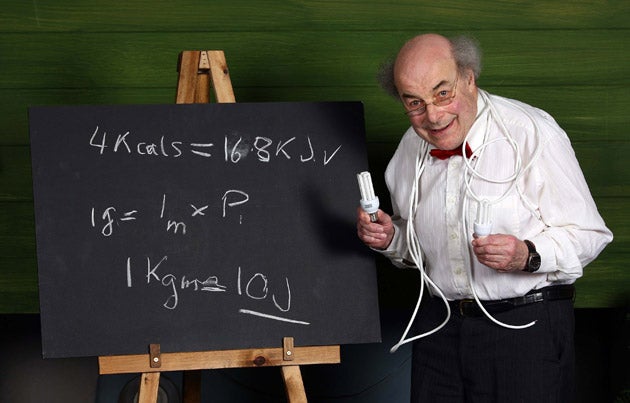Passed/Failed: An education in the life of Professor Heinz Wolff, scientist and broadcaster
'I made toffee in a test tube'

Your support helps us to tell the story
From reproductive rights to climate change to Big Tech, The Independent is on the ground when the story is developing. Whether it's investigating the financials of Elon Musk's pro-Trump PAC or producing our latest documentary, 'The A Word', which shines a light on the American women fighting for reproductive rights, we know how important it is to parse out the facts from the messaging.
At such a critical moment in US history, we need reporters on the ground. Your donation allows us to keep sending journalists to speak to both sides of the story.
The Independent is trusted by Americans across the entire political spectrum. And unlike many other quality news outlets, we choose not to lock Americans out of our reporting and analysis with paywalls. We believe quality journalism should be available to everyone, paid for by those who can afford it.
Your support makes all the difference.Heinz Wolff, 81, is the world's first bio-engineer and the founder of the Institute of Bio-engineering at Brunel University. His television and radio work includes The Great Egg Race on BBC2. He has launched "Britain's Bright Ideas", the npower competition for the best energy-saving inventions (www.npower.com/ brightideas) which ends on 30 June).
I was born in Berlin and can remember at four years old standing in our fourth-floor flat and seeing the torchlit parade of Hitler's Brownshirts. Jews were not allowed into state – that is, non-Jewish – schools and in I went to the Jüdische (Jewish) Waldschule Grunewald school. It was a highly civilised school and I jumped up a form. I didn't do science at school before I was 11 but my father still had his boyhood laboratory set and on Sunday afternoons we would do chemistry. I still remember putting sugar into a test tube, crystalising it and making toffee.
I came to this country on 3 September 1939, the day war was declared, and went to a mixed prep school in London for eight months. I was classified as an enemy alien and was at school with people whose brothers and fathers were being killed by Germans – but at no stage was it ever held against me. I don't believe there is another country where this would have happened.
Then I went to an "elementary" school in Oxford until there was room for me at City of Oxford, a grammar school. It was very good for science and I was very happy. There was an enormous amount of ex-War Department equipment which schools could buy – £1-worth for a penny – and I persuaded my school to buy an "Aladdin's cave" of electronic components.
I had a place to study chemistry at an Oxford college but one morning I got a postcard saying, "As there are ex-Servicemen coming back, would you be prepared to postpone your place for a year?"
I got myself a place as a technician at the department of haematology at the Radcliffe Infirmary in Oxford under Robert MacFarlene, who discovered an anti-clotting substance called anti-haemophilic globulin, partly using samples of my blood. At the time there was a major problem with counting red blood cells. I thought of a relatively simple way of mechanising the blood count.
The Medical Research Council had a problem with ways of estimating the dust exposure of men working in mines and I was given a job to work on this. I ended up at University College London and read physiology. In my first summer vacation I worked at King's College, London with the losing team in the race for the Double Helix [the structure of DNA was discovered by Cambridge's Watson and Crick].
In my second vacation I worked at the National Institute for Medical Research and devised a machine which measured how much energy an individual uses. I got a First. In my Finals I was able to quote my own publications. Old engineers and scientists become philosophers. My motivation is: wanting Britain to be as self-sufficient as possible. I have launched npower's competition for people with good ideas on energy conservation. One of the things I would suggest is heated underwear – and I have made such a thing.
My wife knitted underwear out of flexible wire to measure skin temperature; sending a current through it instead would heat the skin. In a store you would ask for a 10-ohm shirt rather than one with a size 16 collar. Also, I was cooking eggs earlier today in a demonstration using some of my energy-saving equipment. Two pages of The Independent give the energy for a nicely soft-boiled egg.
Join our commenting forum
Join thought-provoking conversations, follow other Independent readers and see their replies
Comments